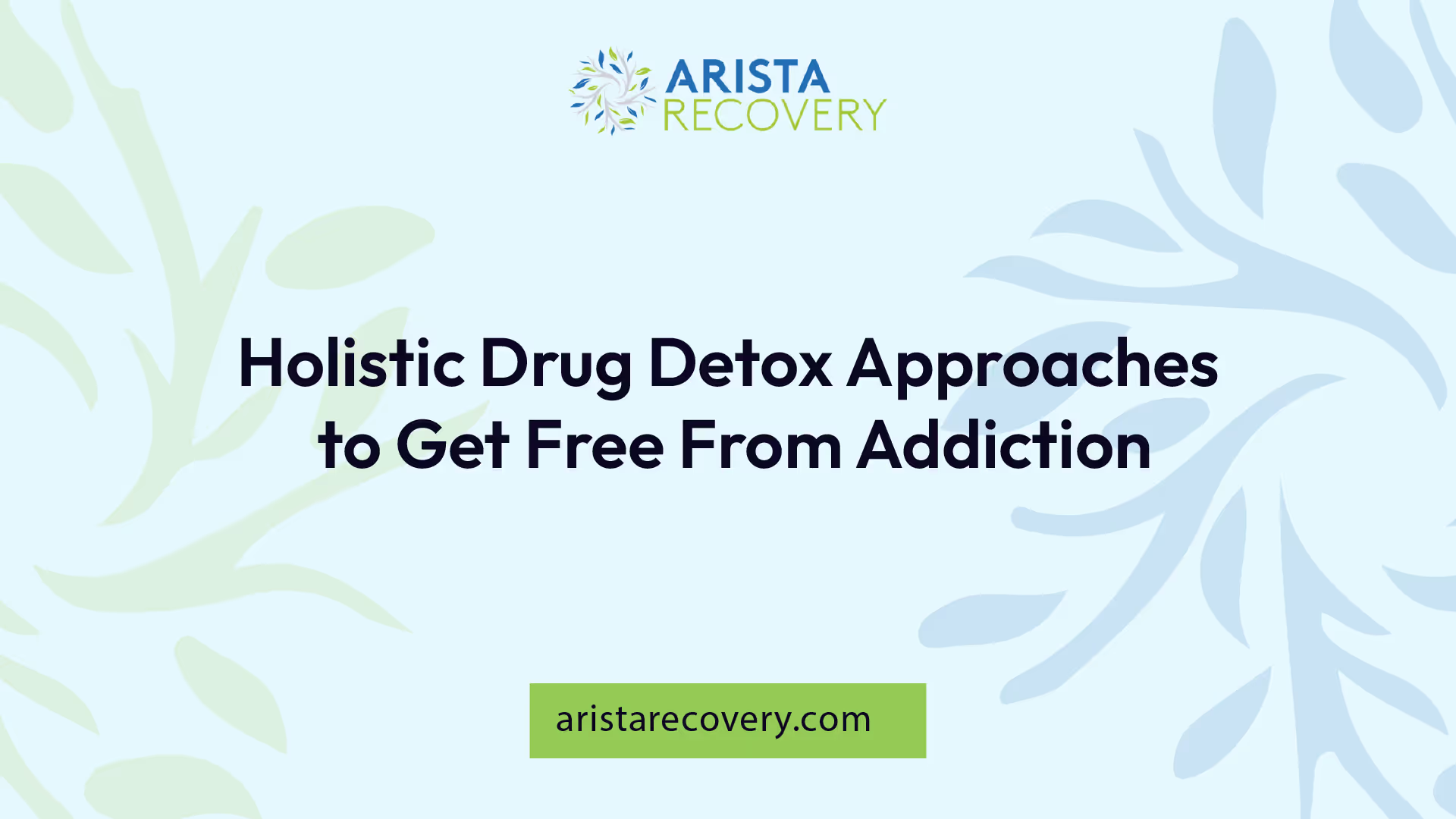
Holistic Drug Detox Approaches to Get Free From Addiction

Understanding Detoxification
Detoxification is a crucial step in the journey towards overcoming substance abuse. It involves a set of interventions designed to manage acute intoxication and withdrawal, aiming to clear toxins safely from the body of an individual who is acutely dependent on or intoxicated by substances [1]. This phase is critical as it lays the foundation for further treatment options and recovery methods.
Detoxification Process Overview
The detoxification process involves three primary stages: evaluation, stabilization, and fostering entry into treatment. This approach ensures that individuals are properly assessed and monitored throughout their detox journey.
StageDescriptionEvaluationAssessment of the individual's physical and psychological state to determine the necessary level of care.StabilizationManagement of withdrawal symptoms and ensuring safety as the body clears substances.Fostering Entry into TreatmentEncouraging and facilitating the transition to ongoing treatment for substance use disorders.
It is important to note that detoxification is distinct from substance abuse treatment and rehabilitation. While detox focuses on the physical aspects of withdrawal, it does not address the psychological, social, and behavioral issues that accompany addiction.
Goals of Detoxification
The primary goals of detoxification are to safely manage acute withdrawal symptoms and to clear toxins from the individual’s body. By doing so, detoxification aims to prepare the individual for comprehensive treatment to address their substance use disorder.
Key goals include:
Successful detoxification services depend on implementing recognized guidelines and treating patients with compassion and understanding. This holistic approach fosters a supportive environment that encourages individuals to begin their recovery journey effectively.
Outpatient Drug Rehab Programs
Outpatient drug rehab programs provide an essential option for individuals seeking treatment for substance addiction. These programs offer flexibility while allowing participants to engage in their daily responsibilities, making them a viable choice for many.
Benefits of Outpatient Rehab
One of the primary advantages of outpatient rehab is the level of flexibility it affords participants. Individuals typically attend programs for an average of 10 hours per week, either during the day or at night. This arrangement enables them to continue managing work, school, and family life while receiving the necessary addiction treatment [2].
Additional benefits include:
BenefitDescriptionFlexibilityAllows schedule adjustments based on personal commitments.Lower CostGenerally more affordable than inpatient or residential programs.Ongoing SupportProvides a support system that includes family and friends.Community ResourcesOffers access to local meetings and community recovery groups.
Outpatient drug rehab serves as the lowest level of care that patients can transition to after completing more intensive options, such as inpatient programs or partial hospitalization [2]. The therapies provided in outpatient settings are similar to those found in residential programs but often at a less intensive level.
Individualized Treatment Plans
Addiction treatment centers prioritize the development of individualized outpatient programs tailored to each patient. This personalized approach ensures a higher probability of successful rehabilitation. Factors influencing the customization of treatment plans include:
FactorImportanceType of SubstancesDifferent substances may require unique treatment strategies.Amount of Substance UseHigher usage levels may necessitate more intensive care.Duration of UseLong-term users might have different therapeutic needs.Co-occurring ConditionsMental health issues can complicate addiction treatment.
Outpatient rehab centers often provide ongoing medication maintenance services, particularly for individuals recovering from prescription drug abuse. This may include a detox method known as tapering, where a physician gradually reduces the dosage of the medication to help individuals overcome physical dependence [2].
Customizing treatment plans enhances the effectiveness of outpatient drug rehab, providing the tools and support needed for individuals to successfully navigate their recovery journey while maintaining daily responsibilities.
Medication-Assisted Treatment (MAT)
Medication-Assisted Treatment (MAT) is an integral part of recovery for individuals struggling with substance use disorders, particularly opioid addiction. This approach combines the use of medications with counseling and behavioral therapies to provide a comprehensive treatment plan that addresses both the physical and psychological aspects of addiction.
Role of MAT in Recovery
MAT plays a vital role in helping individuals regain control over their lives. It aids in managing cravings and withdrawal symptoms, which can often be barriers to recovery. By utilizing medications, MAT supports patients in staying abstinent during their treatment, significantly reducing the risks of relapse and overdose.
Key benefits of MAT include:
Medications for Opioid Use Disorder
The following medications are commonly used in MAT for opioid use disorder:
MedicationDescriptionEffectivenessMethadoneA long-acting opioid agonist that reduces withdrawal symptoms and cravings.Proven safe and effective for reducing narcotic dependency. (NCBI)BuprenorphineA partial opioid agonist that helps prevent withdrawal symptoms and cravings, while having a lower risk of misuse compared to full agonists.Effective in stabilizing individuals and facilitating recovery.NaltrexoneAn opioid antagonist that helps prevent relapse by blocking the effects of opioids.Useful for improving treatment outcomes when patients are motivated and engaged.
MAT, particularly with the inclusion of medications like methadone, has been shown to significantly reduce illicit drug use, criminal activity, and improve psychological well-being among individuals with opioid dependence. This holistic approach to drug detox serves as a critical component in combating addiction, helping individuals not only to detoxify but also to foster a sustainable recovery path.
Withdrawal Management
Withdrawal management is a crucial component of drug detox to get free from addiction. This process focuses on the medical and psychological care needed for individuals experiencing withdrawal symptoms as a result of ceasing or reducing their drug use [4]. Understanding the symptoms and available treatments can significantly aid in recovery.
Withdrawal Symptoms and Care
Withdrawal symptoms vary depending on the substance and can range from mild to severe. Common symptoms for various substances include:
SubstanceWithdrawal SymptomsDurationAlcoholAnxiety, tremors, nausea, seizures2-10 daysOpioidsMuscle aches, insomnia, cravingsUp to several weeksBenzodiazepinesAnxiety, insomnia, seizuresDays to weeksStimulantsFatigue, depression, psychotic symptoms3-5 days
Patients must receive appropriate monitoring and care throughout the withdrawal process to manage symptoms effectively. In the case of alcohol withdrawal, severe symptoms can present a life-threatening situation, necessitating emergency medical intervention.
Medications for Withdrawal
To alleviate withdrawal symptoms, healthcare professionals may prescribe various medications tailored to the specific substance involved. Below is a table summarizing commonly used medications for different types of withdrawal:
SubstanceMedicationPurposeAlcoholBenzodiazepines (e.g., diazepam)Reduces anxiety and prevents seizuresOpioidsBuprenorphine, methadoneHelps control cravings and withdrawal symptomsBenzodiazepinesGradual tapering of diazepamReduces risk of seizuresStimulantsSymptomatic medication (e.g., diazepam for agitation)Alleviates severe agitation
Each medication should be administered following specific protocols to effectively control symptoms and facilitate a more comfortable withdrawal experience [4]. This management is critical before beginning psychosocial treatment to ensure that individuals are stable and ready for further recovery efforts.
Evolution of Detoxification Services
The evolution of detoxification services reflects significant changes in societal attitudes towards addiction and recovery. Understanding these changes is crucial in grasping the current landscape of drug detoxification.
Changes in Detox Methods
Since the 1970s, detoxification services have transitioned dramatically. Initially, public intoxication was often treated as a criminal offense. Today, the approach has shifted to a medical or social model that incorporates medical intervention, medication, and supportive non-hospital environments [1].
Key developments in detox methods include:
YearChange in Detox Method1970sShift from criminal to medical/social approach1995Publication of TIP 19 introducing refined patient placement procedures2000sIncreased knowledge of withdrawal physiology and pharmacological advances
These changes reflect a more nuanced understanding of addiction, moving beyond simple detoxification to a comprehensive approach that recognizes the need for ongoing treatment after detoxification.
Challenges and Advancements
Despite advancements, several challenges remain in the detoxification landscape. One major issue is the separation of detox services from substance abuse treatment, which results in fragmented care [1]. This fragmentation can hinder the effectiveness of treatment plans by isolating the detoxification process from the necessary psychological and social support.
Reimbursement systems further complicate this model, often treating detoxification as a standalone service rather than part of a continuum of care. This leads to issues such as:
ChallengeImpactFragmented care due to independent management of detox servicesHinders access to counseling and necessary supportSeparate reimbursement systems for detox and treatmentReduces continuity of care
However, effective integration of detoxification and treatment has shown promise. Research indicates that successful linkage results in better recovery rates, decreased frequency of detoxifications in the future, and overall reductions in healthcare costs and crime.
Overall, while significant advancements have been made in detoxification services, challenges still exist. Addressing these will be crucial for enhancing the recovery journey for individuals seeking freedom from addiction.
Methadone Maintenance Treatment
Effectiveness of Methadone
Methadone maintenance treatment (MMT) is specifically designed for individuals with narcotic dependence. Numerous studies have confirmed its safety and effectiveness. The primary goals of this treatment are to reduce illicit drug consumption, minimize criminal behavior, and enhance social productivity and psychological well-being among clients.
Over time, MMT has been observed to significantly lower heroin use and criminal activity, while also boosting social functioning and employment prospects when compared to non-methadone outpatient treatment modalities [3].
Study OutcomeImpact of MMTReduction in heroin useSignificant decrease observedCriminal activityNotable reductionSocial functioningImprovement in employment prospects
Factors Affecting Treatment Success
The effectiveness of methadone maintenance treatment can vary among individuals. Approximately one in four clients may not respond well to MMT. The reasons behind this variability can be categorized into client factors and program factors.
Client Factors
Program Factors
Factor TypeExamplesImpact on SuccessClient FactorsMotivationHigher motivation leads to better responseProgram FactorsDosing policiesAppropriate dosing improves effectiveness
This comprehensive understanding of methadone maintenance treatment and the various factors influencing success can aid individuals seeking drug detox to get free from addiction. By addressing both personal and programmatic elements, treatment can be optimized for better outcomes.
References
[2]:
[3]:
[4]:
When mental health challenges and addiction intersect, it can feel isolating. At Arista, we offer compassionate, evidence-based, and trauma-informed care to help you heal, grow, and move forward.
You’re not alone in this.
When mental health challenges and addiction intersect, it can feel isolating. At Arista, we offer compassionate, evidence-based, and trauma-informed care to help you heal, grow, and move forward.
Support that moves with you.
You’ve taken a brave first step. At Arista Recovery, we’re here to help you continue with best-in-class care designed for long-term healing and support.
.webp)






